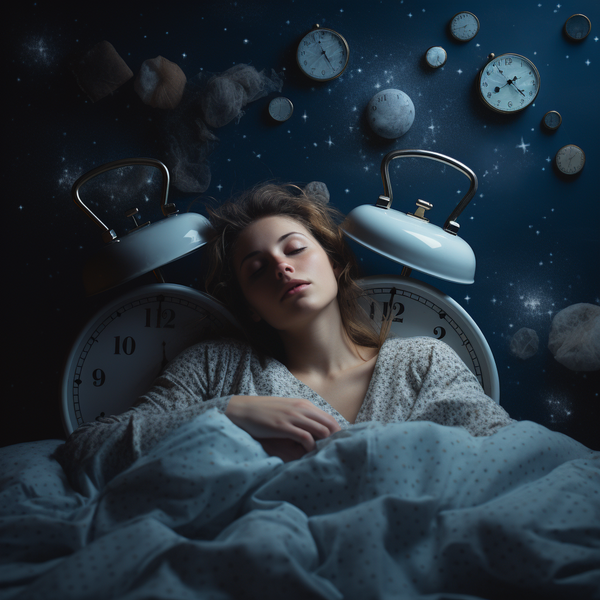In the bustling tapestry of our daily lives, the importance of sleep often gets overlooked. However, sleep is not just about "turning off" after a long day but about rejuvenating our bodies, strengthening our immune system, and consolidating memories. Let’s delve into the significance of sleep and how certain supplements can enhance its quality.
Understanding Sleep and Its Phases
Sleep, rather than being a simple state of unconsciousness, is a dynamic process interwoven with several distinct phases. These phases can be primarily categorized into REM (Rapid Eye Movement) sleep and various stages of non-REM sleep. A crucial phase, and one that is often the topic of interest, is deep sleep.

Diving Deeper into Deep Sleep?
What is Deep Sleep?
Deep sleep, often termed as slow-wave sleep, marks a period when the body transitions from mere rest to a mode of significant restoration and rejuvenation. This stage is essential for various reasons:
-
Physical Recovery: This isn’t just about getting over the day's tiredness. Deep sleep is when the body gets into a mode of repair and regeneration. Damaged cells are repaired, growth hormones are released aiding in muscle development, and overall, the body's wear and tear get tended to.
-
Energy Restoration: It's not just the mind that gets tired; our cells do too. During deep sleep, energy reserves at the cellular level are refilled, ensuring we wake up refreshed and energized.
-
Brain Detoxification: Recent research has shed light on how our brain uses this time to detoxify. The brain gets rid of waste products that accumulate during the waking hours, ensuring optimal neural health.
-
Memory Consolidation: Ever wondered why, after a good night's sleep, things seem clearer? This is because deep sleep is when our brain processes, organizes, and stores new memories, making learning and recall more effective.
How Much Deep Sleep Do We Need?
The need for sleep, including deep sleep, varies considerably based on our age, lifestyle, and overall health. As mentioned by Healthline:
-
Infants (4-12 months): Their developing bodies and brains need 12-16 hours of sleep, inclusive of naps.
-
Children (1-2 years): As they begin to explore the world more actively, they need about 11-14 hours of sleep, with naps playing an essential role.
-
Preschoolers (3-5 years): Their sleep requirement slightly reduces to 10-13 hours, but naps remain crucial.
-
School-age children (6-12 years): As academic and extracurricular demands increase, they need a solid 9-12 hours to ensure optimal growth and cognitive development.
-
Teenagers (13-18 years): With the onslaught of puberty and increasing social engagements, teens still need 8-10 hours for overall well-being.
-
Adults (18-60 years): The hustle of life requires adults to get at least 7 hours or more, ensuring they remain at their productive best. For those aged 61 or older, 7-9 hours remains the sweet spot to counter the physical changes of aging.

Supplements That Can Aid Sleep
For those struggling to achieve a sound night's sleep, certain supplements might be the key. Always consult a healthcare professional before starting any supplement regimen. Here are a few that have shown promise:
-
Magnesium: This mineral can help relax the muscles and the nervous system, potentially leading to improved sleep quality.
-
Lavender: Known for its calming properties, lavender can reduce anxiety and induce sleepiness. Lavender oil capsules or aromatherapy may be effective.
-
Mexican Valerian Root: Often used in herbal teas, valerian root can help reduce the time it takes to fall asleep.
-
L-theanine: Found in tea leaves, L-theanine can promote relaxation without causing drowsiness.
- Relora: Derived from the bark of the magnolia and phellodendron trees, Relora is believed to manage stress levels, thus potentially improving sleep quality for those who find rest elusive due to anxiety or stress.

FAQ's
Q1: What is the significance of sleep in our daily lives?
Sleep is vital for rejuvenating our bodies, strengthening our immune system, and consolidating memories. It's not just about "turning off" but actively restoring our physical and mental well-being.
Q2: What are the primary categories of sleep phases?
Sleep phases are primarily categorized into REM (Rapid Eye Movement) sleep and various stages of non-REM sleep. Deep sleep, a key phase, is often discussed due to its significance.
Q3: Why is deep sleep considered essential?
Deep sleep is vital for physical recovery, energy restoration, brain detoxification, and memory consolidation. It's when our body undergoes significant restoration and rejuvenation, ensuring we wake up refreshed and with clear cognition.
Q4: How much deep sleep is recommended for different age groups?
Sleep needs vary by age. Infants need 12-16 hours, children (1-2 years) need 11-14 hours, preschoolers 10-13 hours, school-age children 9-12 hours, teenagers 8-10 hours, and adults 7 hours or more. Those aged 61 or older should aim for 7-9 hours.
Q5: What are some supplements that can aid in achieving better sleep?
Some supplements that may improve sleep quality include Magnesium, Lavender, Mexican Valerian Root, L-theanine, and Relora. However, always consult a healthcare professional before starting any supplement regimen.

Hey there, dear readers! While we've put in our best effort to provide you with insightful information about sleep, it's essential to remember that everyone's body is unique. What works wonders for one person might not have the same effect on another. Before making any changes to your routine or starting any supplements, it's always a good idea to consult with a healthcare professional. After all, your well-being is our top priority. Stay informed and sleep tight! 🌙💤

